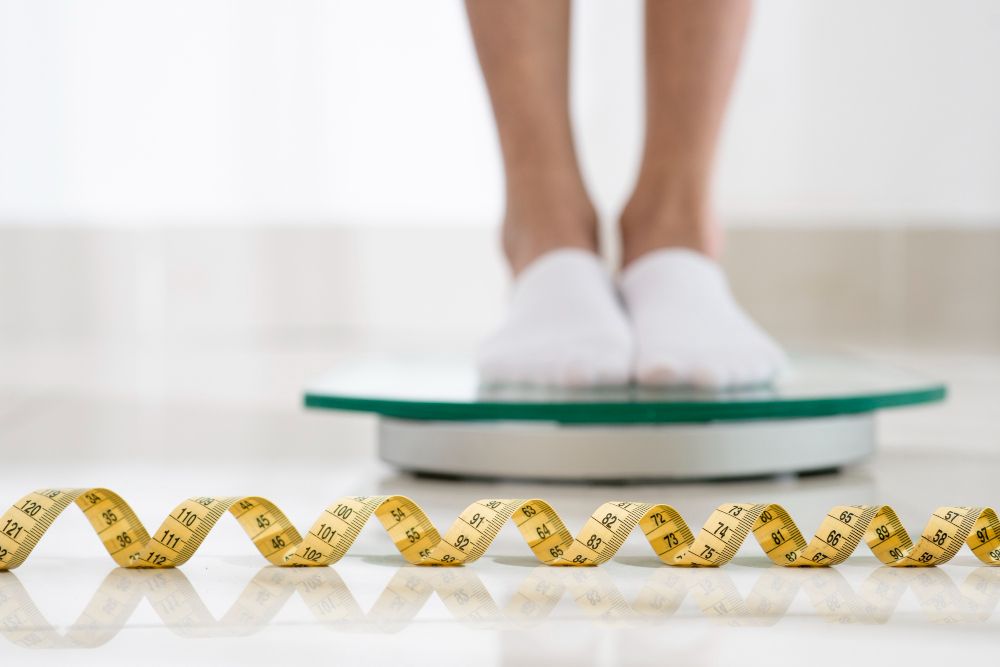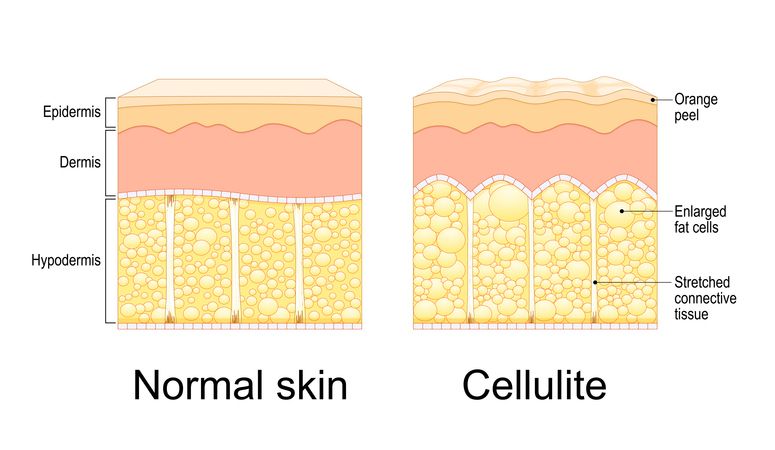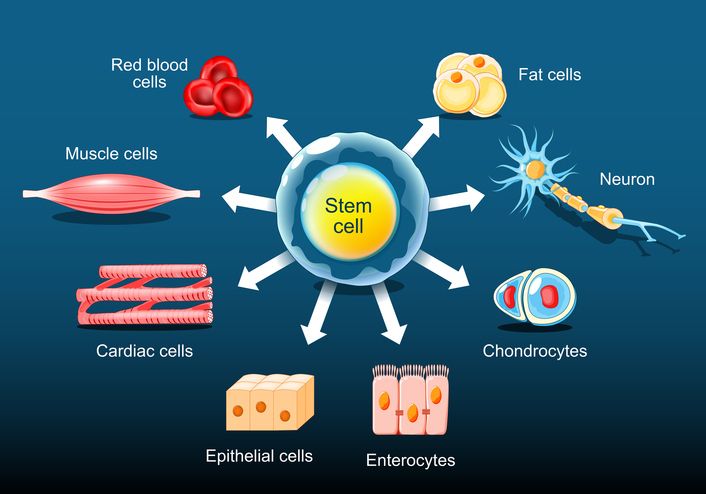
Author: Natalie Ng|Updated: 14 May 2025
If you're always thinking about your next meal, dragging through the day, snapping at people for no reason, freezing even when it’s warm, or wondering why the scale hasn’t moved—your calorie intake might be too low. You could be trying so hard to lose weight that you’ve slowed everything down without realising it. Yes, eating fewer calories can help reduce body weight. But if you drop too far below what your body needs, things start to backfire. Your metabolism slows, your energy dips, and your body shifts into “hold on to everything” mode. That means less progress, not more. Healthy weight loss isn’t about pushing through hunger or forcing your body to survive on as little as possible. It’s about eating enough to support your body while still promoting weight loss. You need the right number of calories to keep things running properly—especially if you're aiming to maintain muscle mass, stay active, and avoid weight regain later. Keep going—you’ll see the warning signs that your current calorie intake might be holding you back.

Constant Hunger and Obsessing Over Food

Ongoing hunger signals low calorie intake
Feeling hungry all the time—even right after eating, can be your body’s way of telling you that your calorie intake is too low to support your current weight and daily activity level. Hunger is more than just an inconvenience. It’s a clear sign your body isn’t getting the number of calories it needs to function properly.
Food takes over your thoughts
If you catch yourself constantly thinking about your next meal, craving high calorie foods, or scrolling through food content online, it's not just a lack of willpower. This happens when your body feels underfed. Low calorie diets or skipping meals can make your brain focus on food as a survival response. It's trying to push you to eat more calories to meet your nutritional needs.
Hunger affects your sleep, mood, and focus
Eating too few calories can lead to poor sleep, low focus, and mood swings—especially between meals. If your diet doesn’t provide enough energy, it impacts your ability to concentrate, keep up with work, and stay calm. A calorie deficit that’s too large can also lower your protein intake, affecting muscle mass, which in turn reduces how many calories your body burns at rest.
This type of hunger isn't just a lack of willpower—it’s your body telling you that it needs more support. A healthy diet for weight loss should control hunger without leading to constant food cravings or mental fatigue. Tracking your food intake with a calorie counter or food diary can help you check if your daily calorie intake lines up with your goals.

Low Energy and Constant Fatigue

Eating too few calories drains your energy
If you're constantly tired, dragging yourself through the day, or struggling to finish everyday tasks, your calorie intake could be too low. Your body burns calories just to stay alive—this is your basal metabolic rate. That includes breathing, digestion, circulation, and brain activity. When your caloric intake doesn’t meet these basic needs, your body starts slowing everything down to save energy.
You might feel like you’re running on empty, even if you’re technically following a weight loss program. Low calorie diets often lead to fatigue because your body doesn’t have enough fuel to function. Even simple things—like walking up stairs, doing housework, or carrying groceries—can feel harder than usual.
Workouts become harder to finish
Exercise requires more calories than rest. If you're not eating enough, your body doesn’t have the energy to support physical activity. You may feel weak, lightheaded, or like your muscles give out quickly. It becomes difficult to keep up with your normal routine, which can lead to less physical activity overall. That lowers calorie consumption even further and may stall your weight loss.
If you need frequent naps, zone out during meetings, or feel wiped out by mid-afternoon, your body might be telling you it needs more calories. A lower calorie intake that leaves you too tired to move won’t support sustainable weight loss.
Book Now to Experience
S6 Body Sculpting Treatment
1 Minute Self-Registration
Date should not be before minimal date

Poor Sleep and Night-Time Restlessness

Low calorie intake disrupts your sleep cycle
Eating too few calories can make it harder to fall asleep and stay asleep. Even if you feel exhausted, your body may be too stressed to rest properly. When your calorie intake is too low, your body can release more cortisol—a stress hormone that keeps you alert. Instead of winding down, your brain stays active and your body stays tense.
You might wake up several times a night, feel anxious for no reason, or lie in bed thinking about food. These are all signs your body is in survival mode, not recovery mode. Sleep becomes lighter and more broken, making it harder for your body to repair and recharge.
Hunger interferes with overnight recovery
If you're not eating enough—especially in the evening—your body doesn’t have the energy it needs to support muscle repair, regulate hormones, or balance blood sugar during sleep. This can lead to:
• Hunger pangs waking you up
• Restless legs or twitching
• Racing thoughts about food
• Trouble falling back asleep once you wake
These symptoms affect your overall health and weight loss progress. Poor sleep increases hunger hormones like ghrelin, which makes you crave sugary foods the next day. That can lead to emotional eating and even weight gain, despite a lower calorie intake.
If you're struggling to sleep through the night, it may be time to reassess your food intake—especially your evening meals.

Mood Swings and Short Temper

Skipping calories affects your emotional balance
If you find yourself snapping at people over small things, feeling unusually anxious, or crying for no clear reason, it might not just be stress—it could be your diet. A very low calorie intake can cause sudden shifts in mood, making it harder to stay calm, focused, and emotionally stable.
When you don’t eat enough, your blood sugar drops. That triggers a stress response in your body, which affects how your brain functions. Your mood becomes harder to control, especially when you're also feeling tired or hungry.
Low calories disrupt your hormones
Cutting too many calories messes with your body’s hormonal balance. Cortisol increases, while serotonin—the hormone that helps keep you calm and stable—can drop. This imbalance can lead to:
• Sudden outbursts
• Feeling low for no clear reason
• Difficulty concentrating
• General irritability throughout the day
Your brain needs glucose from food to regulate emotions and support mental clarity. Without it, simple tasks feel harder, and emotional reactions feel more intense. You may also crave sugary foods more, which can lead to a cycle of emotional eating and poor blood sugar control.
To support your mood and mental health, you need to meet your body’s basic caloric needs. Without enough fuel, even everyday situations can feel overwhelming.
Book Now to Experience
S6 Body Sculpting Treatment
1 Minute Self-Registration
Date should not be before minimal date

Weight Stalls Despite Staying on Track

Low calorie intake slows your metabolism
If you’ve been counting calories, staying active, and still not losing weight, your calorie intake may be too low. When the body doesn’t get enough energy, it begins to conserve it. That means your metabolism slows down, and weight loss can stall—even if your food intake hasn’t changed.
This is your body’s natural survival response. It adjusts to fewer calories by using less energy and holding on to body fat. So even with strict food tracking or a structured weight loss program, you may stop seeing results if your intake remains too low for too long.
Signs your body has adjusted to fewer calories
• No change in body weight for more than three weeks
• Energy levels feel lower than before
• Muscle tone becomes less visible
• Workout results start to drop off
Gradual calorie increases support progress
To move past the plateau, slightly increase your calorie intake—usually by 100 to 200 calories a day. This helps your body shift out of low-energy mode. Include high protein foods to protect muscle mass and avoid processed foods that offer little nutritional value.
Use tools like a calorie counter or body weight planner to check whether your current calorie intake still fits your activity level and goal weight. Your needs change as your weight changes, so your daily calorie intake should adjust too.

Muscle Weakness and Loss of Strength

Less fuel reduces muscle performance
If your workouts feel harder than usual, or you’ve noticed a drop in strength, low calorie intake could be the cause. Your muscles rely on calories—especially from carbohydrates and protein—to perform and recover. Without enough, your body starts using stored energy from muscle tissue, which leads to loss of lean body mass over time.
You may find it harder to finish exercises that once felt easy. Your endurance drops. Your muscles tire quickly. Even recovery between sets takes longer. These signs suggest your body isn’t getting the fuel it needs to support your physical activity and maintain muscle mass.
Signs of calorie-related muscle loss
• Lifting less weight than usual
• Needing longer rest between sets
• Feeling weak or shaky during workouts
• Soreness that lingers longer than normal
• Dizziness during or after physical activity
Why strength declines
When calorie intake drops too far below your needs, your body uses muscle for energy. This reduces your overall muscle mass and weakens your metabolism. Since muscle helps your body burn more calories—even at rest—losing it makes weight management harder in the long run.
Keeping your protein intake steady and avoiding very low calorie diets helps protect your strength and prevent muscle loss. If workouts have become a struggle, it’s time to reassess your food intake and make sure you’re supporting your body’s energy demands.
Book Now to Experience
S6 Body Sculpting Treatment
1 Minute Self-Registration
Date should not be before minimal date

Feeling Cold More Often Than Usual

Low calorie intake reduces body heat
If you’re constantly reaching for extra layers or feel cold even when others are comfortable, your calorie intake might be too low. Calories aren’t just fuel for movement—they also help regulate body temperature. When you eat too few, your body conserves energy by lowering internal heat production.
This response is common with very low calorie diets or long periods of calorie restriction. Your metabolism slows, and less energy is available for basic functions like maintaining warmth. You might find yourself shivering in mild weather or struggling to warm up even indoors.
Signs your body isn’t producing enough heat
• Cold hands and feet most of the day
• Needing heavier clothing when others don’t
• Preferring hot drinks just to feel normal
• Feeling chilly in places that never bothered you before
• Using more blankets at night
Why this happens during weight loss
Body fat helps insulate you, but calorie restriction also impacts thyroid function and circulation—both of which affect how your body responds to cold. If you’ve been trying to eat fewer calories to speed up weight loss and start noticing cold sensitivity, it's a sign your caloric intake may be too low to meet your basic needs.
Bringing your calorie intake closer to your recommended daily calorie intake can help restore normal body temperature and support overall health. This also allows your body to stay active and maintain a stable metabolism.

Obsessive Calorie Counting and Food Tracking

Strict tracking may signal too few calories
Using a calorie counter or food diary can support healthy weight loss—but when it turns into constant tracking or food anxiety, it may mean your calorie intake is too low. If you feel the need to measure every bite, overanalyze nutrition labels, or fear going over your daily calories, your approach may be too restrictive.
Low calorie diets often cause this shift in mindset. The less you eat, the more your brain fixates on calorie consumption. This can lead to emotional eating, cravings for sugary foods, and a strained relationship with food overall.
Signs your tracking is too extreme
• Feeling guilty after eating high calorie foods
• Skipping social events to avoid food
• Constantly checking calorie tracking apps
• Fear of gaining weight after small treats
• Eating only “safe” low calorie meals every day
Eating healthy doesn’t mean cutting out all high calorie foods or obsessively counting calories. A flexible approach that includes a variety of food groups is more effective for long-term weight management. If tracking makes you more anxious than informed, you may benefit from increasing your food intake to reduce stress and support better weight regulation.
Book Now to Experience
S6 Body Sculpting Treatment
1 Minute Self-Registration
Date should not be before minimal date

Loss of Lean Body Mass Instead of Body Fat

Not eating enough leads to muscle loss
When your calorie intake stays too low for too long, your body starts breaking down muscle tissue for energy—especially if your protein intake is also lacking. While the goal might be to lose weight, losing lean body mass slows your metabolism and makes it harder to maintain a healthy weight in the long run.
Muscle helps your body burn more calories throughout the day, even at rest. If you lose too much of it, your daily calorie needs drop. This makes weight regain more likely once you return to a normal diet.
Signs you’re losing muscle instead of fat
• Arms and legs feel thinner but softer
• Decreased strength without visible fat loss
• Weight goes down, but your shape doesn’t change
• Workouts feel harder, with longer recovery times
• Slower progress despite eating fewer calories
Why protecting muscle is essential for weight loss
To support sustainable weight loss, your body needs both a moderate calorie deficit and enough protein to preserve muscle mass. A high protein diet combined with moderate physical activity—especially strength training—helps maintain lean muscle while reducing body fat.
Using a calorie calculator that factors in muscle mass and physical activity can help guide your daily calorie intake. Avoid extreme low calorie diets that sacrifice muscle and leave your metabolism weaker over time.

Balancing Calorie Intake for Healthy Weight Loss

Eating enough while promoting weight loss
To lose weight without harming your health, you need to reduce calorie intake gradually—not drastically. The goal is to eat fewer calories than your body burns, but still enough to support daily functions, physical activity, and muscle mass.
Most people do well with a moderate calorie deficit of 300–500 calories below their recommended daily calorie intake. This allows for gradual weight loss while maintaining energy, strength, and focus.
Use a calorie calculator or body weight planner to estimate your needs based on your current weight, goal weight, and activity level. Include high protein foods, whole grains, fruits, and vegetables in your diet to stay full and avoid cravings. Avoid cutting out food groups or relying on very low calorie diets, as these can trigger weight regain and muscle loss.

A Smarter Alternative to Extreme Calorie Cutting: S6 Body Sculpting Treatment
Address stubborn fat without starving your body
Throughout this article, we’ve seen how cutting too many calories can backfire. Constant hunger, fatigue, poor sleep, muscle loss, and stalled weight loss are all signs your body isn’t getting enough fuel. While reducing calorie intake is necessary to lose weight, going too far can slow your progress and harm your health.
That’s why S6 Body Sculpting Treatment offers a better approach—one that doesn’t force your body into survival mode or leave you drained. Instead of relying solely on food restriction, S6 directly targets fat where it's most resistant, without affecting your energy or lean body mass.
How S6 Body Sculpting works
This treatment uses low-energy bio-laser technology to break down stubborn fat cells in key areas like the belly, arms, thighs, and back. The released fatty acids are naturally removed through lymphatic drainage, assisted by vacuum suction that boosts circulation and metabolic activity. As the fat breaks down, the treatment also stimulates collagen production, helping your skin stay firm as your shape changes.
While a very low calorie diet can weaken your metabolism, S6 helps support it—so you don’t have to constantly reduce your daily calorie intake to see visible results.
Why this method works better than severe calorie restriction
• No need to starve your body to burn fat
• Helps prevent common signs of under-eating like fatigue, irritability, and plateaus
• Reduces fat mass while preserving muscle
• Targets areas where calorie counting alone doesn’t help
• No downtime, no surgery, and no risk of triggering weight regain
A sustainable way to promote fat loss
Many people spend months eating fewer calories, only to feel weaker, colder, and stuck. S6 Body Sculpting helps break that cycle. It’s ideal if you want to keep your caloric intake at a healthy level while still working toward your goal weight.
Instead of continuing to lower your calorie consumption and sacrifice energy, you can support fat reduction more efficiently—and comfortably—with the help of this non-invasive method.
Book your S6 Body Sculpting Treatment today and move beyond crash diets. Support fat loss while staying strong, active, and well-nourished.
New Beauty's S6 Body Sculpting TreatmentBook Now to Experience
S6 Body Sculpting Treatment
1 Minute Self-Registration
Date should not be before minimal date
FAQ
Can I lose weight without reducing my daily calorie intake?
While a calorie deficit is necessary for weight loss, it doesn’t always require strict calorie cutting. You can create a calorie deficit by increasing your physical activity or improving your food quality—such as replacing high calorie foods with nutrient-dense options. For example, cutting back on liquid calories, sugary foods, and refined grains can help reduce calorie intake naturally without leaving you hungry. Tracking your food intake with a calorie counter can also give better insight into where you may be over-consuming without needing to restrict too aggressively.
Why do I still gain weight when I eat fewer calories?
Weight gain despite eating fewer calories can happen if your metabolism slows due to long-term calorie restriction, stress, or low muscle mass. Very low calorie diets can reduce your basal metabolic rate and lead to water retention, making it seem like you’re gaining weight. It's also possible that hidden calories—from sauces, snacks, or processed foods—push your intake higher than expected. Using calorie tracking apps and paying attention to nutrition labels can help clarify your actual calorie consumption and identify any patterns that may lead to weight gain.
How many calories should I eat to maintain my current weight?
The number of calories needed to maintain weight depends on your age, body weight, activity level, and lean body mass. A person with a physically demanding job or who engages in moderate physical activity will need more calories than someone who is sedentary. You can use a calorie calculator or body weight planner to estimate your recommended daily calorie intake. Eating at your maintenance level supports your energy, muscle mass, and overall health without promoting fat gain or loss.
Is it better to reduce calories or build more muscle to lose weight?
Both strategies work best when combined. Reducing calorie intake promotes fat loss, while building more muscle mass helps your body burn more calories at rest. Muscle is metabolically active, meaning it increases your daily calorie burn—even when you're not working out. A high protein diet paired with strength training supports lean body mass and can make your weight loss efforts more effective and sustainable.
Can S6 Body Sculpting replace the need for dieting completely?
S6 Body Sculpting is not a replacement for a healthy diet but can enhance results when paired with healthier eating habits. It helps reduce localized fat and reshape body contours, especially in areas that resist change through diet and exercise alone. However, long-term weight maintenance still relies on balanced calorie consumption, regular physical activity, and proper nutrition. S6 works best as part of a broader weight management plan that includes monitoring your calorie intake and maintaining a healthy lifestyle.
Recommended Articles
COPYRIGHT© NEW BEAUTY MANAGEMENT LIMITED 2026. ALL RIGHT RESERVED.




